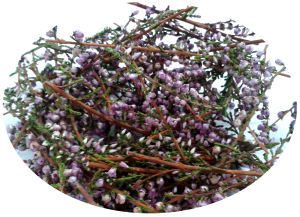


Heather is the common name for plants of the genus Erica, belonging to the Ericaceae family.
About 600 species are known for the genus Erica. Erica lusitanica (Spanish or Portuguese heath), Calluna vulgaris (common heather, ling, heather, Scotch heather) and Erica umbellata (dwarf Spanish heath) are all known as heather. In Portugal these heathers are popularly used to dry the bread baking furnaces as well as to light fire, replacing gorse.
This plant has a long folk medicinal history which has caught science's attention resulting in some important studies related to heather's antioxidant and anti-inflammatory capacities. Heather is a good urinary antiseptic and diuretic, working as a disinfectant of the urinary tract and increasing the amount of urine. It contains specific phytochemicals like arbutoside, tannins, triterpenes, quercetin, carotenes, etc. Arbutoside has anti-inflammatory properties, works as a powerful urinary tract antiseptic and is useful in treating cystitis, urethritis, benign prostate hyperplasia, hyperuricemia, gout and gall stones besides being diuretic, cleansing and astringent.
The tannin content and its astringent effect support the contraction of the upper layers of the mucosae, reducing the production of secretions and easing irritation, which makes heather helpful in colds and cough.
In heather there are several groups of natural chemical compounds with anti-cancer, antioxidant and antimicrobial activity, namely triterpenes and phenolic compounds (ex. tannins). In the last decade more study has been dedicated to the confirmation of biological activity of the triterpenes. More than 80 triterpenes have been identified from plants, some of them used specifically as anti-cancer and anti-inflammatory in Asian countries. Simultaneously, heather is rich in phenolic compounds with known antioxidant capacity and referenced as having anti-mutagen and anti-cancer characteristics. Tannins (phenolic compounds) have a broad spectrum of biological activity such as the ability to increase vitamin C levels inside cells, which leads also to an increased ability to neutralize free radicals and inhibit collagen from deteriorating, for example, during an infection or inflammation. Working like this, tannins participate in immunological, anti-infectious and anti-inflammatory processes and also prevent the synthesis of compounds which promote inflammation and allergies such as histamines, prostaglandins and leukotrienes. Their antioxidant capacity is 20 to 50 times higher than that of vitamin C and E, known by their high antioxidant activity. Nowadays, the relationship between free radicals, premature aging processes and all degenerative diseases including all heart diseases, cancers and arthritis is well established. Knowing this is very useful for human health in order to prevent several chronic diseases.
The infused flowers are used for coughs, colds and urinary tract conditions. It is recommended to drink 3 to 4 cups a day. Externally, a cataplasm of the boiled flowers is used to treat arthritis and rheumatism. This hot cataplasm is also a natural treatment for chilblains. Heather oil for skin conditions is obtained by patiently macerating 100g fresh flowers in 500g good quality olive oil.
Pregnant and nursing women should see their doctor before drinking this infusion.
References:
- A Guide To Medicinal Plants In North Africa. Centre for Mediterranean Cooperation, International. IUCN - Spain, 2005;
- Feijão, Raul D’Óliveira. Medicina pelas Plantas. Livraria progresso editora – 4ª edição, 1957;
- Infopédia - http://www.infopedia.pt/$urze
- Plants for A Future – http://www.pfaf.org/user/Plant.aspx?LatinName=Calluna+vulgaris
- Valadez-Vega, Carmen. Delgado-Olivares, Luis. González, José A. Morales. García, Ernesto Alanís. Ibarra, J. R. Villagomez. Moreno, Esther. Gutiérrez, Manuel. Martínez, María Teresa Sumaya. Clara, Zuñiga Pérez. Ramos, Zuli Calderón. The Role of Natural Antioxidants in Cancer Disease, Oxidative Stress and Chronic Degenerative Diseases - A Role for Antioxidants, Dr. Jose Antonio Morales-Gonzalez (Ed.), ISBN: 978-953-51-1123-8, InTech, DOI: 10.5772/51503. Available from: http://www.intechopen.com/books/oxidative-stress-and-chronic-degenerative-diseases-a-role-for-antioxidants/the-role-of-natural-antioxidants-in-cancer-disease;
- Zhao, Jiewen. The extraction of high value chemicals from heather (Calluna vulgaris) and bracken (Pteridium aquilinum). The University of York Chemistry, April 2011.
Insert date: 2014-01-10 Last update: 2014-01-14
Comment
![]()
![]()
![]()
Authors > Contributor writers > Cláudia Maranhoto
Other foods